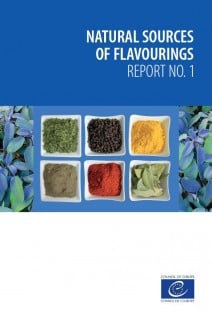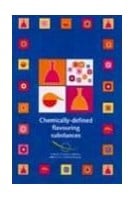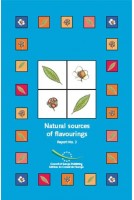



The Committee of Experts on Flavouring Substances of the Council of Europe has engaged in a major review of the safety-in-use of over 600 natural flavouring source materials. This book provides safety-in-use evaluations of the first set of 101 source materials.Natural sources of flavourings are materials of vegetable or animal origin, whether or not they are normally consumed as food, from which flavourings may be obtained. The committee of experts has predominantly evaluated materials in the raw or dried state, with the exception of certain special products, such as vanilla, cocoa and black pepper, which are traditionally processed (e.g. fermented) before their use as source materials.Each source species is identified primarily by its systematic name based on the botanical nomenclature of Zander or, where the source species is not listed in that reference book, using that of Mansfeld. Source species not listed in either book are treated on a case-by-case basis. Synonyms in English, French, German, Italian, Spanish are noted under each respective language.Each datasheet indicates the parts used and provides a list of the "important constituents", including the known "active principles" and "other chemical components", found in each part of the plant and/or preparation used in flavourings. Where possible, the levels at which the various constituents are present in the parts/preparations are given and the main food categories in which parts/preparations are used are listed. The types of preparation made from each part are stated, e.g. oleoresin, extract, etc.Main toxicological data are indicated such as metabolism; sub-acute and sub-chronic toxicity; chronic toxicity; carcinogenicity; reproductive and teratogenicity studies; mutagenicity; other relevant studies, e.g. photosensitivity and beneficial effects.National and international evaluations are specified, together with the main references and databases used.
ALPHABETICAL INDEX OF THE EVALUATED NATURAL SOURCES OF FLAVOURINGS
Abelmoschus moschatus Moench / Acer saccharum Marsh / Achillea millefolium L / Aframomun melegueta K. Schum / Agropyron repens (L.) Beauv / Aloysia triphylla (L'Herit.) Britt / Amyris balsamifera L / Angelica archangelica L / Annona cherimola Mill / Annona squamosa L / Anthoxanthum odoratum L / Anthriscus cerefolium (L.) Hoffm / Artemisia abrotanum L / Artemisia absinthium L / Artemisia dracunculus L / Artemisia spicata Wulf / Artemisia umbelliformis Lam / Artemisia pallens /Artemisia pontica L / Artemisia vallesiaca Lam / Artemisia vulgaris L / Artemisia herba-alba Asso / Aspidosperma quebracho-blanco Schlechtend / Berberis vulgaris L / Boronia megastigma Nees ex Bartl / Boswellia sacra Fleckiger / Bursera ssp / Cananga odorata Hook. fil. et Thomson f. macrophylla / Carica papaya L / Carum carvi L / Castor fiber L / Centaurium erythraea Rafn / Cinchona officinalis L / Cinchona pubescens Vahl /Cistus ladanifer L. / Citrus aurantiifolia (Christm.) Swingle / Citrus aurantium L. ssp. Aurantium L., rind / Citrus aurantium L. ssp. Aurantium L., flower / Citrus aurantium L. ssp. Aurantium L., leaf and twig / Citrus auriantum L. ssp. Bergamia (Risso&Poit.) / Citrus auriantum L. var. myrtifolia Ker-Gawl / Citrus japonica Thum / Citrus limon (L.) Burm. Rind / Citrus limon (L.) Burm. leaf and twig / Citrus medica L. var. medica / Citrus reticulata Blanco / Citrus reticulata Blanco var. deliciosa H.H.Hu /Citrus reticulata Blanco var. unshiu (Marco.) H.H.Hu / Citrus sinensis (L.) Pers / Citrus x paradisi Macfad / Cocos nucifera L / Cola acuminata (P.Beauv.) Schott&Endl / Cola nitida (Vent.) Schott&Endl / Corylus avellana L / Curcuma longa L / Cymbopogon citratus (DC.) Stapf / Cymbopogon flexuosus (Nees ex Steud.) W. Wats / Cymbopogon martinii (Roxb.) W.Wats. var. martinii / Cymbopogon nardus (L.) W.Wats / Cymbopogon winterianus Jowitt / Eucalyptus globulus Labill / Evernia prunastri (L.) Ach / Ferula assa-foetida L / Ferula gummosa Boiss / Fortunella japonica (Thunb.) Swingle / Galium odoratum (L.) Scop / Gardenia jasminoides Ellis / Gentiana lutea L / Hierochloe odorata L / Hordeum vulgare L / Hypericum perforatum L / Illicium verum Hook / Jasminum grandiflorum L / Jasminum officinale L / Laurus nobilis L / Mangifera indica L / Marsdenia cundurango Rchb. f. / Murraya koenigii (L.) Spreng / Musa L. species, Musa sapientum L / Olea europaea L / Piper cubeba L / Plantago lanceolata L / Populus nigra L / Quercus alba L / Saccharum officinarum L / Sambucus nigra L / Santalum album L / Schinus molle L / Swertia chirata Buch.-Ham. ex Wall / Triticum aestivum L. emend. Fiori et Paol / Urtica dioica L / Vaccinium macrocarpon Ait / Vaccinium myrtillus L /Vaccinium uliginosum L / Valeriana officinalis L / Vanilla planifolia G.Jacks / Vetiveria zizanoides (L.) Nash / Viola odorata L / Viola tricolor L / Viverra zibetha Schreber / Zea mays L.





The Committee of Experts on Flavouring Substances of the Council of Europe has engaged in a major review of the safety-in-use of over 600 natural flavouring source materials. This book provides safety-in-use evaluations of the first set of 101 source materials.Natural sources of flavourings are materials of vegetable or animal origin, whether or not they are normally consumed as food, from which flavourings may be obtained. The committee of experts has predominantly evaluated materials in the raw or dried state, with the exception of certain special products, such as vanilla, cocoa and black pepper, which are traditionally processed (e.g. fermented) before their use as source materials.Each source species is identified primarily by its systematic name based on the botanical nomenclature of Zander or, where the source species is not listed in that reference book, using that of Mansfeld. Source species not listed in either book are treated on a case-by-case basis. Synonyms in English, French, German, Italian, Spanish are noted under each respective language.Each datasheet indicates the parts used and provides a list of the "important constituents", including the known "active principles" and "other chemical components", found in each part of the plant and/or preparation used in flavourings. Where possible, the levels at which the various constituents are present in the parts/preparations are given and the main food categories in which parts/preparations are used are listed. The types of preparation made from each part are stated, e.g. oleoresin, extract, etc.Main toxicological data are indicated such as metabolism; sub-acute and sub-chronic toxicity; chronic toxicity; carcinogenicity; reproductive and teratogenicity studies; mutagenicity; other relevant studies, e.g. photosensitivity and beneficial effects.National and international evaluations are specified, together with the main references and databases used.
Attention, en vertu de nos conditions générales de vente, l'achat des PDF/epub est réservé aux particuliers.
